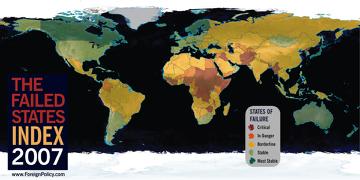F in Citizenship
 Foreign Policy magazine has come out with its annual listing of "Failed States. Perhaps not surprisingly, most of the media attention to this list has focused on Iraq being #2 on the list, behind Sudan. Of greater interest to me, however, are two of the subsidiary pages: the methodology of the analysis of failure, and a chart showing a relationship between failed environments and failed statehood.
Foreign Policy magazine has come out with its annual listing of "Failed States. Perhaps not surprisingly, most of the media attention to this list has focused on Iraq being #2 on the list, behind Sudan. Of greater interest to me, however, are two of the subsidiary pages: the methodology of the analysis of failure, and a chart showing a relationship between failed environments and failed statehood.
Foreign Policy's graph mapping the correlation between sustainability and stability shows clearly that the two are positively connected: failed states are almost invariably environmental disasters, and stable states are in nearly every case reasonably sustainable. On the surface, this is entirely unsurprising; people living in fear for their lives are not apt to be good stewards of the environment. But two unanswered questions leap to mind that could dramatically change the analysis: the definition of sustainability (I couldn't find a reference for FP's sustainability ratings updated*); and the direction of causation.
FP's brief definition of sustainability is "a country’s ability to avoid environmental disaster and deterioration." That, of course, sounds more like "resilience" to me, and says nothing about a country's ability to maintain functioning ecosystems, clean water, and the like. It's very likely that the environmental resilience of a state will closely match the political and social resilience. But even states that manage to get their political acts together could be unable to survive if key ecological systems and resources are lost or insufficient.
An even bigger question is the direction of causation. To what degree is the environmental degradation or collapse in these states the result of the failure of governance, and to what degree is the environmental degradation or collapse a contributor to the failure of governance? Both can be true, of course, but is there a clear trend or pattern? This is an important question, because if environmental degradation tends to precede state collapse (not as the sole factor in the collapse, but as an important political "forcing"), the acceleration of global warming-related ecosystem disruptions will mean more than economic loss and climate refugees.
Given the potential importance of this factor, it's odd that while it appears in the Foreign Policy discussion, it's not an element in the analysis.
For this study, Foreign Policy looks at 12 factors for failure, including demographic pressures, the economy, delegitimization of the state, and external intervention. Each of these is rated on a 1-10 scale; the worst four failed states (Sudan, Iraq, Somalia and Zimbabwe) all include lots of 10s. These factors, and the ratings, are derived by a method referred to as CAST: Conflict Assessment System Tool. The 12 failure factors are matched against five core "capacities to cope," then run up against STINGS:
STINGS are the unanticipated factors that act as catalysts to accelerate or decelerate the immediate risk of conflictSTINGS is an acronym used here to describe:
Surprises (e.g., currency collapse)
Triggers (e.g., assassinations, coup d'etats)
Idiosyncrasies (e.g., non-contiguous territory, a deference to authority)
National Temperaments (e.g., cultural or religious perspectives)
Spoilers (e.g., disgruntled followers, excluded parties)
(No, I don't know where the "G" in STINGS comes from; shouldn't it be STINTS?)
Security analysts have been trying to assemble a workable quantitative assessment of geopolitical stability for decades. Most have had readily-identifiable flaws (for example, the RAND Strategy Assessment System, built by the RAND Corporation in the 1980s and early 1990s, used a model of US-Soviet friction that had, as its least threatening level, a conflict equivalent to the Cuban Missile Crisis). CAST is no exception -- one clearly missing element is the degree to which neighboring states add pressure for failure, whether due to their own failure or as a means of undermining geopolitical opponents. As with the environment, Foreign Policy recognizes the importance of this factor in its own discussion, but it really should go into the core analysis.
Failed states are the end-point of "system disruption" warfare. We need to get a lot better at understanding all of the operational factors if we're going to have any chance of figuring out a way to respond effectively. And in this struggle, global guerillas and global warming operate hand in hand.
* UPDATE: Carolyn O'Hara from Foreign Policy wrote to tell me that the environmental ratings were based on "environmental sustainability scores provided by the 2005 Environmental Sustainability Index produced by Yale and Columbia." Thank you, Carolyn.






Comments
interestingly i just saw on treehugger that Ban Ki Moon has recently identified the root cause of the Darfur crisis as climate change, saying "[it] began as an ecological crisis, arising at least in part from climate change"
Posted by: joy | June 20, 2007 6:00 AM